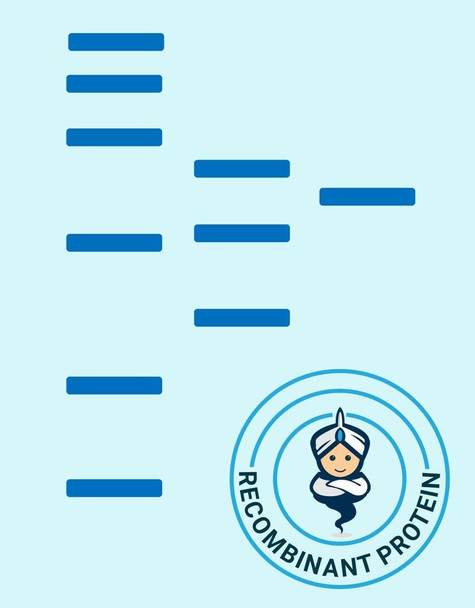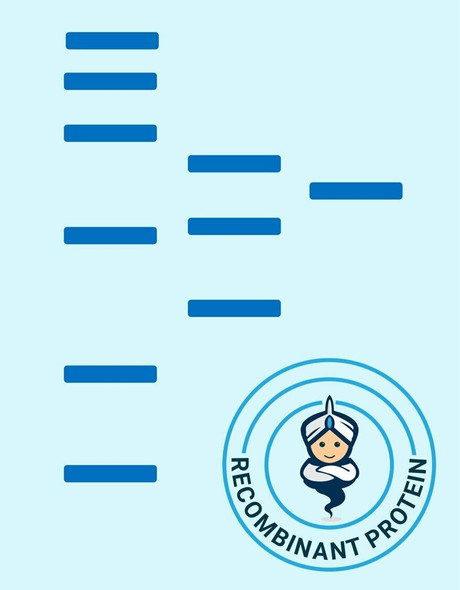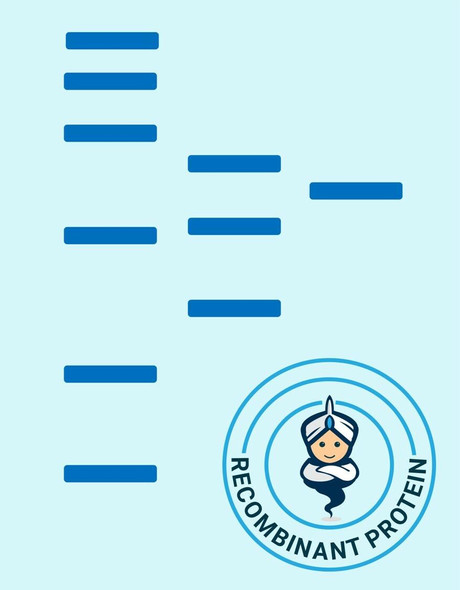Human CD207 Recombinant Protein (RPPB3113)
- SKU:
- RPPB3113
- Product type:
- Recombinant Protein
- Size:
- 20ug
- Species:
- Human
- Target:
- CD207
- Synonyms:
- C-type lectin domain family 4 member K
- CLEC4K
- Langerin
- CD207
- Source:
- Escherichia Coli
- Uniprot:
- Q9UJ71
Description
| Product Name: | Human CD207 Recombinant Protein |
| Product Code: | RPPB3113 |
| Size: | 20µg |
| Species: | Human |
| Target: | CD207 |
| Synonyms: | C-type lectin domain family 4 member K, CLEC4K, Langerin,CD207. |
| Source: | Escherichia Coli |
| Physical Appearance: | Sterile Filtered clear solution. |
| Formulation: | CD207 protein solution (1mg/ml) containing 20mM Tris 8.0 and 10% glycerol. |
| Stability: | Store at 4°C if entire vial will be used within 2-4 weeks. Store, frozen at -20°C for longer periods of time. For long term storage it is recommended to add a carrier protein (0.1% HSA or BSA).Avoid multiple freeze-thaw cycles. |
| Purity: | Greater than 85.0% as determined by SDS-PAGE. |
| Amino Acid Sequence: | MGSSHHHHHH SSGLVPRGSH MGSPRFMGTI SDVKTNVQLL KGRVDNISTL DSEIKKNSDG MEAAGVQIQM VNESLGYVRS QFLKLKTSVE KANAQIQILT RSWEEVSTLN AQIPELKSDL EKASALNTKI RALQGSLENM SKLLKRQNDI LQVVSQGWKY FKGNFYYFSL IPKTWYSAEQ FCVSRNSHLT SVTSESEQEF LYKTAGGLIY WIGLTKAGME GDWSWVDDTP FNKVQSARFW IPGEPNNAGN NEHCGNIKAP SLQAWNDAPC DKTFLFICKR PYVPSEP |
CD207 (C-type lectin domain family 4 member K) is expressed in Langerhans cells which are immature dendritic cells of the epidermis and mucosa. Moreover, CD207 is expressed in several other dendritic cell types including dermal CD103+ DCs and splenic CD8+ DCs. Langerin is localized in the Birbeck granules, the organelles present in the cytoplasm of Langerhans cells and comprised of superimposed and zippered membranes. CD207 is a C-type lectin with mannose binding specificity, and it has been suggested that mannose binding by the CD207 protein leads to internalization of antigen into Birbeck granules thus providing access to a nonclassical antigen-processing pathway.
CD207 Human Recombinant produced in E.Coli is a single, non-glycosylated polypeptide chain containing 287 amino acids (65-328 a.a) and having a molecular mass of 32.2kDa.CD207 is fused to a 23 amino acid His-tag at N-terminus & purified by proprietary chromatographic techniques.
| UniProt Protein Function: | langerin: Calcium-dependent lectin displaying mannose-binding specificity. Induces the formation of Birbeck granules (BGs); is a potent regulator of membrane superimposition and zippering. Binds to sulfated as well as mannosylated glycans, keratan sulfate (KS) and beta-glucans. Facilitates uptake of antigens and is involved in the routing and/or processing of antigen for presentation to T cells. Major receptor on primary Langerhans cells for Candida species, Saccharomyces species, and Malassezia furfur. Protects against human immunodeficiency virus-1 (HIV-1) infection. Binds to high-mannose structures present on the envelope glycoprotein which is followed by subsequent targeting of the virus to the Birbeck granules leading to its rapid degradation. Homotrimer. Exclusively expressed by Langerhans cells. Expressed in astrocytoma and malignant ependymoma, but not in normal brain tissues. |
| UniProt Protein Details: | Protein type:Receptor, misc.; Membrane protein, integral Chromosomal Location of Human Ortholog: 2p13 Cellular Component: endocytic vesicle; early endosome membrane; plasma membrane; integral to membrane Molecular Function:mannose binding; carbohydrate binding Biological Process: antigen processing and presentation of peptide antigen via MHC class I; antigen processing and presentation of exogenous peptide antigen via MHC class I, TAP-dependent; antigen processing and presentation of exogenous peptide antigen via MHC class I; defense response to virus Disease: Birbeck Granule Deficiency |
| NCBI Summary: | The protein encoded by this gene is expressed only in Langerhans cells which are immature dendritic cells of the epidermis and mucosa. It is localized in the Birbeck granules, organelles present in the cytoplasm of Langerhans cells and consisting of superimposed and zippered membranes. It is a C-type lectin with mannose binding specificity, and it has been proposed that mannose binding by this protein leads to internalization of antigen into Birbeck granules and providing access to a nonclassical antigen-processing pathway. Mutations in this gene result in Birbeck granules deficiency or loss of sugar binding activity. [provided by RefSeq, Aug 2010] |
| UniProt Code: | Q9UJ71 |
| NCBI GenInfo Identifier: | 229784129 |
| NCBI Gene ID: | 50489 |
| NCBI Accession: | Q9UJ71.2 |
| UniProt Related Accession: | Q9UJ71 |
| Molecular Weight: | 328 |
| NCBI Full Name: | C-type lectin domain family 4 member K |
| NCBI Synonym Full Names: | CD207 molecule, langerin |
| NCBI Official Symbol: | CD207 |
| NCBI Official Synonym Symbols: | CLEC4K |
| NCBI Protein Information: | C-type lectin domain family 4 member K; CD207 antigen, langerin; Langerhans cell specific c-type lectin; C-type lectin domain family 4, member K |
| UniProt Protein Name: | C-type lectin domain family 4 member K |
| UniProt Synonym Protein Names: | Langerin; CD_antigen: CD207 |
| Protein Family: | C-type lectin domain family |
| UniProt Gene Name: | CD207 |
| UniProt Entry Name: | CLC4K_HUMAN |






